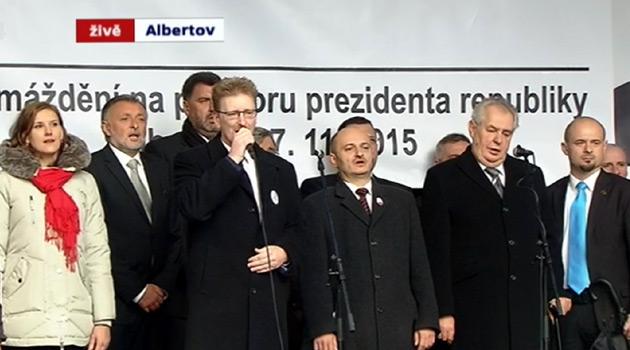Czech President: The migration crisis is an organized invasion, PM's position risks the country's security

Czech Prime Minister Bohuslav Sobotka (Czech Social Democratic Party – ČSSD), according to Czech President Miloš Zeman, is risking the security of the Czech Republic through his position on the refugee crisis. The President told the Czech daily Mladá fronta DNES that the current migration wave is an organized invasion.
Zeman also rejected the PM’s critique of his having made an appearance on the occasion of the state holiday on 17 November at Albertov in Prague for an event also attended by the chair of the Bloc against Islam, Martin Konvička. The President said the decision as to who would be standing on the podium for that event was made by the organizers and not by him.
Speaking at a gathering of the commanders of the Czech Army on Tuesday, Zeman declared that danger has arrived at the borders of the country. He alleged that it is naive to believe there is no connection between the migration wave and terrorism.
Sobotka responded that the danger is posed by terrorists, not by refugees, who must be aided. Zeman believes such a position is dangerous to the Czech Republic: "Through [the PM’s] indecision, his reluctance, and his many other seemingly conciliatory and seemingly humanistic gestures, in my opinion he is underestimating the real danger, and I, unlike him, consider the migration crisis to be an organized invasion."
The so-called Islamic State, according to Zeman, is unquestionably delivering its jihadists into the migration flows, which he alleges has apparently been confirmed by the terrorist attacks in Paris. Last week Sobotka said that Zeman had taken his place among those populists who are feeding like parasites on people’s fears of the migration crisis and the so-called Islamic State when he made a speech on 17 November side-by-side with representatives of the extremist Bloc against Islam.
"You know, I’m an elderly gentleman. I disregard boyish insolence such as this with a smile. Nevertheless, I would be be glad if the Prime Minister would grasp that, on the contrary, I called publicly at Albertov for dialogue, for respect for differing opinions, and for tolerance," Zeman told the daily.
Sobotka insists the President of the Czech Republic is not supposed to appear on the same stage together with extremists and xenophobes. "A directly-elected politician should not just passively accept the prevailing mood of society, but should actively defend humanistic and moral principles, and the truth, irrespective of whether it is momentarily popular to do so," the PM told the Czech News Agency yesterday.
The PM pointed out that the first President of Czechoslovakia, T. G. Masaryk, managed during the Hilsner Affair to unequivocally make a stand against anti-Semitism. "I will have the same patience with Mr President that I have had for the past two years, and even though we have different opinions on several matters, I will not argue with him through the media," Sobotka said.
"I am neither a censor nor a screener," the President has said of his 17 November appearance. He claims to have not studied the Bloc against Islam and to have only recently learned of Konvička’s remarks, for example, about "grinding Muslims into meat and bone meal" or closing them up in concentration camps.
Zeman called that "certainly an extreme and unacceptable position." However, as long as people do not adopt such positions, the Czech President said he believes anybody has the right to criticize any religion.
Konvička was charged on 18 November with inciting hatred against Muslims precisely because of such remarks he posted to Facebook. Should he be convicted he faces between six months and three years in prison.
Police say Konvička abused a publicly accessible computer network to allegedly commit his crimes. Meanwhile, Zeman has said that these current disputes should not have any influence on his relationship with the Prime Minister.
"Politicians should get along, whatever they think of each other personally, because in both our cases we were democratically, legitimately elected in free elections with secret ballots," the President said. Sobotka said previously that he does not want to break off communications with the Office of the President.
"Mr President and I have established regular, very intensive communications. Those communications will continue irrespective of whether we absolutely agree or disagree on all matters," he said.